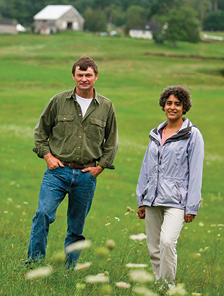Learn about SARE's broader impact on specialty crop production in the United States.
"One really rewarding aspect of the project has been following up with participants a year later and finding lasting effects on their financial management practices."
Kira Bennett Hamilton, The Carrot Project
The Challenge
It’s not easy to make a living running a farm. Most farms, particularly smaller-scale operations, struggle to be profitable, according to the USDA Economic Research Service. Many farmers learn the hard way that successful financial management requires good tools, strategy and organization. Those at particular risk are beginning farmers, who struggle with the financial aspect of running their businesses and lack the necessary business management tools to choose the right strategies for their unique operations.
The Actions Taken
Primed with an existing data set of detailed financial records from 30 farms and four technical service providers collected through a previous SARE grant, The Carrot Project, a Massachusetts-based nonprofit, conducted a detailed analysis of what financial management practices are critical to help farms succeed, and how service providers can best support farmers in implementing those practices. From there, the team developed and implemented a financial-management training program, “Making it Happen: Profitability and Success,” that included case studies, hands-on activities and learning aids.
The Impacts
Eighty-nine farmers participated in six trainings in Massachusetts, New York and Vermont in 2016. The long-lasting effects of the training on its participants were remarkable.
- Increased financial acuity: Fifty farmer trainees growing fruits and vegetables better understood the importance of using financial statements when comparing direct-market sales channels and when evaluating what crops to grow.
- Improved confidence: Eighty-seven percent of trainees expressed confidence in their preparedness because the program taught them job-related management tasks.
- Increased adoption: The percentage of trainees who used accounting software for their farm at least quarterly increased from 64 percent to 81 percent in the months following the training. The majority of trainees are now seeking outside financial advice and are reviewing their financial statements more frequently than before.
- Improved profit margins: Hannah and Ben Wolbach of Skinny Dip Farm in Westport, Mass., are one example of how participating farmers improved their profit margins. Learning to prioritize financial management helped them increase their gross sales by 65 percent and grow their income from $0 to $35,000.
Due to its success, organizers are planning more workshops in 2018 that go into greater detail on financial management.
Learn More
Visit the database of project reports to learn more about this SARE-funded project: ONE15-248 and LNE11-310.


